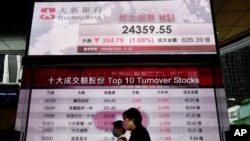HONG KONG — Hong Kong stocks fell nearly 4% Monday as technology firms were hit by concerns over China’s crackdown on the sector and as the country’s tech hub Shenzhen was put into lockdown.
By the break, the Hang Seng Index had shed 3.81%, or 782.32 points, to 19,771.47 — dropping below 20,000 for the first time since mid-2016.
The selloff comes as part of a global retreat fueled by Russia’s invasion of Ukraine, which has sent oil prices soaring and is expected to light a fire under already elevated inflation.
The crisis has further rattled Hong Kong investors who have also had to contend with China’s regulatory crackdown on the private sector, with once-flying technology companies most often in the crosshairs.
The Hang Seng Tech Index shed more than 7% Monday, with market heavyweight Alibaba off around 8% and Tencent more than 4% lower.
Adding to the pain was news on Sunday that China has placed all 17 million residents in Shenzhen under lockdown as it battles a flare-up of COVID-19 cases across the country.
Public transport has been suspended and officials have told all residents to stay at home, with the lockdown set to last until March 20 while three rounds of mass testing are carried out.
The move has led Foxconn, which is a key supplier for Apple and maker of iPhones, to halt operations in the city in response.
The Taiwanese firm, which is also known as Hon Hai Precision and has its Chinese base in the city, did not say how long it would keep its plant shut, but had relocated production to other sites.
The selling follows a rout of Chinese firms listed in the United States last week that was sparked by concerns about a crackdown by authorities there.
Five companies have been ordered to comply with audit requirements by the U.S. Securities and Exchange Commission or face delisting from Wall Street.
The initial group of companies named on a list published by the SEC on Thursday, could soon be followed by all Chinese companies traded in New York, none of which are currently complying with U.S. regulations in this area.
That came as Bloomberg News reported on Friday that China’s leading ride-hailing company Didi Global had put plans to list in Hong Kong on hold as it struggles to appease Beijing over its handling of user data.
“At this stage, we still see the technology space as very vulnerable,” Jun Li, of Power Pacific Investment Management, said. “It is very difficult to evaluate the risk profile at this stage.”




